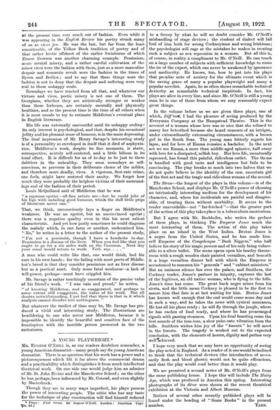A YOUNG PLAYWRIGHT.*
Ma. EUGENE O'NEILL is, as our readers doubtless remember, a young American dramatist—many people say the young American dramatist. There is no question that his work has a power and a picturesqueness which lift it far above the commercial drama and a practicability which distinguishes it from much intellectual theatrical work. On one side one would judge him an admirer of Mr. St. John Ervine and the Manchester School ; on the other he has, perhaps, been influenced by Mr. Conrad, and even slightly by Maeterlinck.
Though they are in many ways imperfect, his plays possess the power of interesting people. The critic who has any taste for the technique of play construction will find himself reduced
- • Plays : First Series. By Eugene London : Jonathan Cape.
17a. 6d.3
to a frenzy by what he will no doubt consider Mr. O'Neill's mishandling of stage devices ; the student of dialect will fall foul of him both for wrong Cockneyisms and wrong IrishismE; the psychologist will rage at the mistakes he makes in treating such a subject as sex repression in a woman. But all this is, of course, in reality a compliment to Mr. O'Neill. He can touch on a large number of subjects with sufficient knowledge to rouse the ire of the expert, which can never be awakened by ignorance and mediocrity. He knows, too, how to put into his plays that peonliar note of anxiety for the ultimate event which is the saving grace of many a popular playwright and many a popular novelist. Again, he as often shows remarkable technical dexterity as remarkable technical ineptitude. In fact, his plays are alive in every line, and since Mr. O'Neill is still a young man he is one of those from whom we may reasonably expect great things.
In the volume before us we are given three plays, one of which, Diff'rent, I had the pleasure of seeing produced by the Everyman Company at the Hampstead Theatre. This is the account of a woman whose love was so nice that she refused to marry her betrothed because she heard rumours of an intrigue, under extraordinarily extenuating circumstances, with a 'brown girl in the South Seas. The young man bitterly regrets his lapse, and for love of Emma remains a bachelor. In the next act we see Emma, a more than middle-aged spinster, half crazy with love for a dissipated, selfish boy. Her love life, unnaturally repressed, has found this painful, ridiculous outlet. The theme is handled with good taste and intelligence but fails to be convincing. The play breaks so much into two halves that we do not quite believe in the identity of the raw, uncertain girl of the first act and the tragic and ridiculous woman of the second.
The Straw—the longest of the plays in this volume—is of the Manchester School, and displays Mr. O'Neill's power of choosing an intrinsically interesting medium for the development of his character, and, where his incidentals are painful and disagree- able, of treating them without morbidity. It seems to the reader unavoidable—not " far-fetched "—that the greater part of the action of this play takes place in a tuberculosis sanatorium.
But I agree with Mr. Bechhofer, who writes the preface of these plays, in thinking The Emperor Jones much the most interesting of them. The action of this play takes place on an island in the West Indies. Brutus Jones is a negro from the United States, and he has made him- self Emperor of the Congolesque " Bush Niggers," who half believe his story of his magic powers and of his only being vulner- able to a silver bullet. The scene opens upon his tawdry throne- room with a rough wooden chair painted vermilion, and beneath it a huge vermilion dinner bell with which the Emperor is accustomed to summon his " generals " and " cabinet ministers." But an ominous silence lies over the palace, and Smithers, the Cockney trader, Jones's partner in iniquity, captures the last of the fugitives, an old native woman, who is flying to the hills. Jones's time has come. The great buck negro arises from his siesta, and the little mean Cockney is pleased to be the first to assure him that fate is at last waiting for him. Brutus Jones has known well enough that the end would come some day and in such a way, and he takes the news with cynical assurance. He has all his plans ready ; he will fly through the jungle, where he has caches of food ready, and where he has prearranged signals with passing steamers. Upon his final boasting come the first sounds of the tom-tom, a slow pulse-rate vibration from the hills. Smithers wishes him joy of the " haunts " he will meet in the forests. The tragedy is worked out to the expected conclusion, with the elements of horror, dignity and pathos very wellaachieved.
I hope very much that we may have an opportunity of seeing the play acted in England. As a reader of it one would beinclined to think that the technical devices (the introduction of neces. sarily flesh and blood ghosts) would not be quite efficacious, and that the play would read better than it would, play.
We are promised a second series of Mr. O'Neill's plays from the same publishing house. I hope this will include The Hairy Ape, which was produced in America this spring. Interesting photographs of its decor were shown at the recent theatrical exhibition at the Victoria and Albert Museum.
Notices of several other recently published plays will be found under the beading of " Some Books " in the present


































 Previous page
Previous page